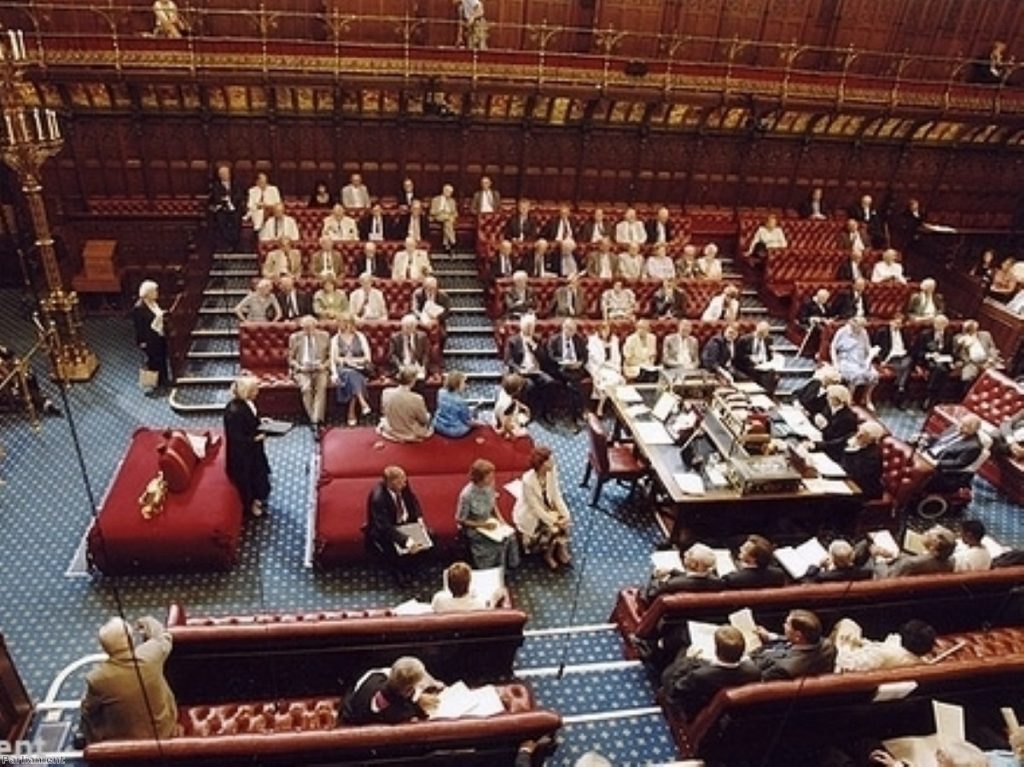Sketch: Revolution in the Lords
This is definitely not what a revolution looks like. Nevertheless, as Barack Obama never said, change has come to the Lords.
Ever since the cash-for-amendments affair last year the Lords have been scandalised into action. The last 12 months has seen the introduction of a new code of conduct, the establishment of an independent commissioner for standards post and, now, the abolition of Lords’ expenses.
“For the House of Lords, it is positively a revolutionary pace,” its avuncular leader, Lord Strathclyde, joked jovially. A low rustling sound filled the chamber, like leaves wafted by an autumn breeze. Peers were laughing softly to themselves.


It was a brief moment of humour in a serious-minded session. A very grave matter of state was being discussed: the announcement by the government that it was supporting Lord Wakefield’s proposal to introduce a flat £300 daily allowance for attendance in the upper chamber.
This, as Lord Strathclyde pointed out apologetically, is lower than the present allowance.
“The single payment would be the end of the matter,” he promised, as if this very great incentive was overriding. The wise old decrepits listened carefully as he told them “this is not a salaried House”.
Quite right, but it didn’t stop crossbench convenor Baroness D’Souza warning that any further reduction in the money provided to peers would “seriously deter some peers from attending at all”. Lord Strathclyde shrugged expansively in response. “This is not a perfect system!” he acknowledged. That, it appeared, was that.
The slow-moving somnolence of the Lords is very different from the (relative) cut-and-thrust of life in the Commons. At first it seemed as if there was no reaction at all, but of course tuning in to the sensitivities of this place requires more finesse than elsewhere. Thirteen per cent (or was it 30%?) of peers didn’t claim any allowances in the last year, according to Lord Strathclyde. “Long may it continue,” he added, after which the slightest murmur of a laugh could be sensed. A tough crowd for stand-ups, this one.
What the place needs is someone with energy and vim. Which may explain its latest arrival, Playschool’s Floella Benjamin, who was among those taking the oath as she entered the House of Lords.
Her naturally dignified theatrical bearing makes her as suited for a role in The Lion King as in Westminster.
Swapping Humpty, Jemima and Little Ted for Lord Strathclyde, Baroness D’Souza and Lord Hunt of King’s Heath might seem like a big step. Actually, it is. This isn’t the Commons, where child’s play is positively encouraged. There Floella, Baroness Benjamin’s incessant energy would easily be soaked up. As it is, she is joining peers with a mental age of 80, not eight. Fidgeting levels on the red benches are expected to rocket.
The reading clerk’s biggest duty of the day was transmitting the Queen’s ennoblement message to parliament’s upper House. It has been carefully crafted over centuries to boost the ego of the baron-to-be. When the Lords are told that you are now entitled to “enjoy and use all the rights, privileges, pre-eminences, immunities and advantages to the degree of a baron duly and or right belonging” the obvious response is to clap one’s hands together and rub them eagerly. Baroness Benjamin declined, giving her celebrated impression of a giraffe instead as she peered magnificently to and fro.
Nevertheless, she was entering a chamber whose future really is up for grabs. Tomorrow peers will debate the reform of the Lords, which is currently the topic of scrutiny by a committee set to report by the beginning of next year at the latest. Half a millennia of tradition could be swept away by the coalition government. How much peers are paid every time they bother to turn up, by comparison, pales into insignificance.
Have Her Majesty’s barons truly realised the peril they are in? Are they capable, even, of rousing themselves to fight? The biggest kerfuffle this afternoon came when Lord Tomlinson, a Labour peer, rose to speak at the same time as the Lib Dems’ Lord Dholakia. Lord McNally, the Liberal Democrat frontbencher, asked “my noble lords to be sensible about this”. The Labour benches, previously silent as the grave, roared and bellowed that it was their side’s turn to speak. “You’re clearly not going to be sensible about this!” Lord McNally said, surrendering.
Appearances can be deceptive: when roused, the Lords can be as stubborn as a mule. Their sloth-like response to the expenses changes doesn’t mean they’ll always be so pliant. Especially when a real revolution comes around.












